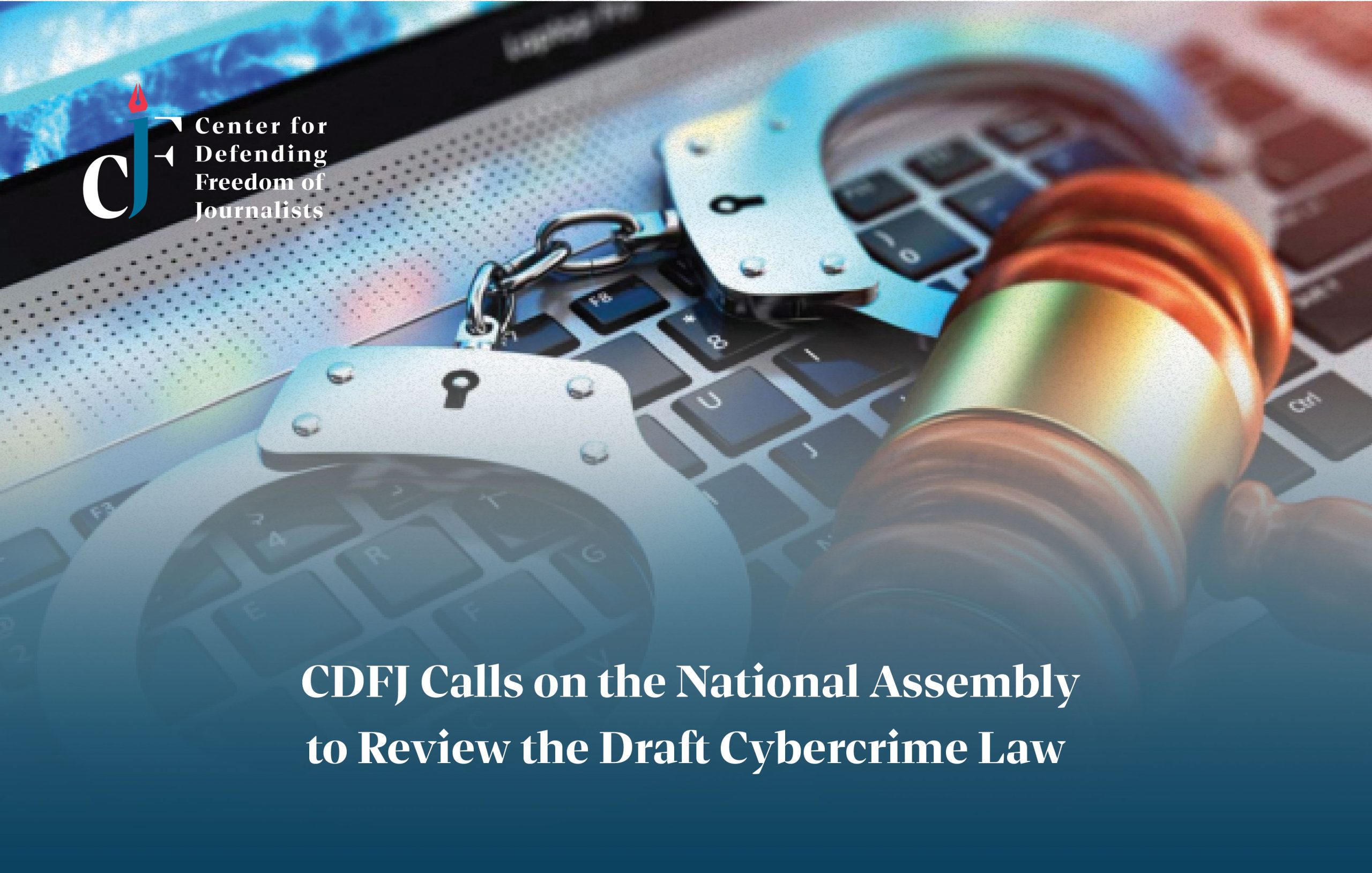
CDFJ Calls on the National Assembly to Review the Draft Cybercrime Law
• The media and users of social media platforms shall not be held responsible for comments.
Center for Defending Freedom of Journalists (CDFJ) called on the National Assembly (Senate and Representatives) to seriously review the draft cybercrime law in a way that guarantees the protection of freedom of expression and the media, and in a way that preserves Jordan’s image as a democratic country that protects public rights and freedoms.
CDFJ confirmed that the initial reading of the draft cybercrime law shows its expansion in custodial penalties, and harsh financial penalties in a way that exhausts the right to freedom of expression and the media.
The Center stated: “We understand that the world has witnessed many technological and communication developments that require dealing with them legally, in order to deter and limit them. We are in favor of addressing information piracy, fraud, impersonation, electronic extortion, exploitation of children and people with disabilities, human trafficking, and promotion of prostitution.”
At the same time, CDFJ opposed placing restrictions on freedom of expression and the media, noting that many of the legal articles contained in the draft law allow arrest and imprisonment, and impose financial penalties of up to 50,000 Jordanian Dinars.
The Center recalled that the media body and users of social media platforms have worked over the past years to abolish Article (11) of the Cybercrime Law in force so far, which has caused the arrest and imprisonment of hundreds claiming that they committed defamation crimes, noting that the new draft law did not cancel the previous text, but rather added many legal articles to it that impose imprisonment for a period of no less than 3 months, not replaced by a fine, and imprisonment penalties of up to 3 years.
The draft law allows legal prosecution for libel and defamation crimes without the need to file complaints or claim personal rights if they were addressed to one of the authorities in the country, official bodies, public administrations, one of its members, or any public employee while performing their job.
CDFJ announced that it will work on preparing a legal review in cooperation and partnership with lawyers and human rights activists, and will be keen to communicate with the government, the House of Representatives and Senate, and all stakeholders to explain the repercussions and restrictions that the draft law will impose if it is passed without radical amendments.
The Center warned that some of the amendments and terms mentioned in the draft law are broad, and allow for multiple interpretations that may be used in ways that constitute restrictions on freedom of expression and the media, indicating that human rights organizations and human rights activists have repeatedly warned against these wordings in the legislation.
CDFJ stated that social media platforms have become an integral part of people’s lives, tools for expressing opinions, and ways to exploring people’s views, and their participation in decision-making, and that imposing restrictions on them greatly limits dialogue in the public sphere, and contradicts the Jordanian state’s orientations in political reform and maximizing the orientation for an effective partisan life, stressing that ensuring freedom of expression and the media is an essential pillar to achieve this.
Further, CDFJ warned against holding the media, including their websites and pages on social media platforms, as well as social media users, legally liable for comments or any content that is published on their pages against their will, as they are not the party that authorizes and controls the publication.
The Center called to review the procedures granted by the draft law to enter places that indicate the commission of a crime, to search, examine and seize, as well as to give the powers of prohibition, blocking, and suspension.
CDFJ said that the conditions, procedures, and measures that the draft law gave to deal with social media platforms, in addition to restrictions and harsh penalties, will cause Jordan to decline in international indicators of rights and freedoms.
The Center urged to review some of the articles of the draft law that cause concern, and fears that it could be a door to restricting freedoms, including, for example; Articles (15, 16, 17, 19, 24, 25, 30, 31, 32, 33, 34, 37).
CDFJ wished not to rush to approve to people’s lives without public consultations and extensive discussion, stressing that previous experiences indicate that harsher penalties will not be a reason to reduce crimes and the phenomena that the government seeks to address, noting that ensuring a proactive flow of information, community awareness, and media education are the best way to confront false and misleading news, hate speech, and most of the crimes that the draft law seeks to reduce and address.
The Center expressed its readiness to organize and hold dialogue sessions that bring together: The government, the legislative authority, journalists, civil society organizations, experts, and activists on social media platforms, to reach a draft law that addresses negative phenomena and prevents prejudice to freedom of expression and the media.

